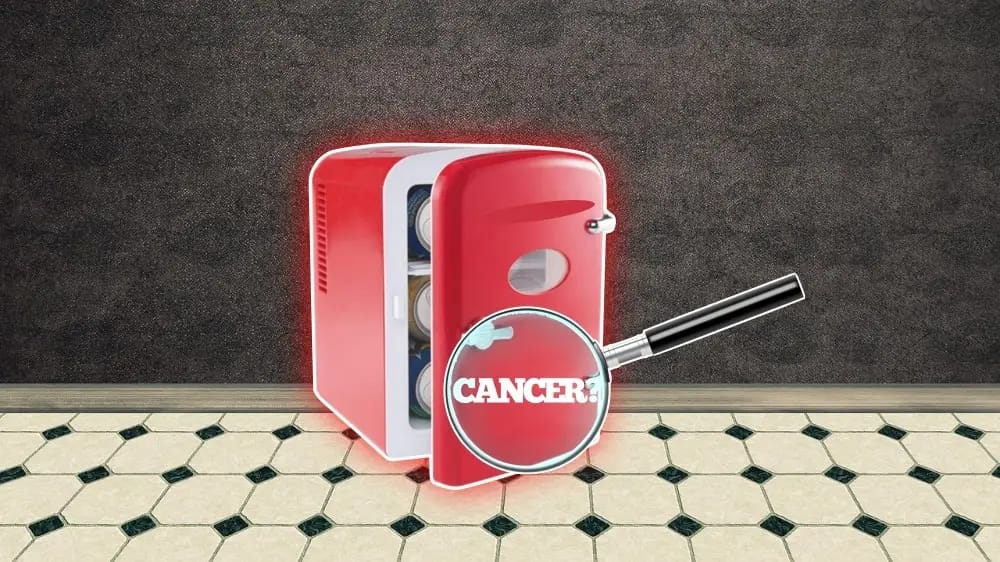Mini fridges are a standard appliance in many households. They are small and portable, making them easy to move from one room to another. Despite their popularity, there is some debate on the safety of these appliances, with some people believing that fridges and mini fridges can cause cancer.
Some people believe that mini fridges can cause cancer or other illnesses because they emit toxic gases that are not healthy for humans to breathe in. These people believe that the chemicals used in plastics and insulation materials can be released into the air when the fridge is running. However, there is not enough evidence to confirm this claim, so it cannot be proven true or false at this time.
Older refrigerators release chlorofluorocarbons (CFCs) into the air, which are later inhaled and can lead to respiratory problems. Newer refrigerators have been redesigned to limit these gases. This chemical was also contributing to the destruction of our precious ozone layer. Chlorofluorocarbons (CFCs) are nontoxic, nonflammable chemicals. Overexposure may cause dizziness, loss of concentration, central nervous system depression, and/or cardiac arrhythmia. However, since refrigerators and mini fridges have limited the use of this chemical, we should be safe.
Old Refrigerators May Release Carcinogenic PCBs
How many people do you know that have been sick because of a fridge or a mini fridge? So, why do some believe that mini fridges can cause cancer?
Carcinogenic PCBs are toxic compounds found in old appliances, fluorescent lighting fixtures, and electrical transformers. Polychlorinated Biphenyls, while not manufactured in the US anymore, are still produced in other countries. Additionally, appliances manufactured before 2000 may contain a small amount of mercury in switches and relays.
As you can see, the belief that refrigerators can make you sick comes from our old appliances. Now that we have debunked different theories about our fridges, there are still things you can do if you are still uneasy about having a mini fridge inside your room.
How to Be Safer with a Mini Fridge
I understand that sometimes anxiety can get the best of us. Nonetheless, mini fridges are safe home appliances to keep almost anywhere. Though they are convenient and can help keep you healthy, it’s essential to understand the precautions that come with their use. There are a couple of things you can do if you want to be extra cautious.
1. Purchase Mini Fridges That Are UL Listed

The abbreviation UL stands for Underwriter Laboratories, a third-party certification organization that determines and certifies products concerning safety. Their work is essential to ensure that products are safe for consumers and workers who use them. If you plan to purchase your mini fridge on Amazon, read the Safety Information tab found in the Product Details section. It will contain important safety information for your new appliance.
2. Keep Your Mini Fridge Away from Heat Sources
One important thing to know about how refrigerators work: they keep food cold by maintaining a low temperature. This means that it’s best not to put the fridge in an area with a lot of sunlight or heat, as these things can warm up the fridge too much. Many of us like to keep our fridge next to our oven, but doing so will make it harder for the compressor to work. As a result, your mini fridge will consume more electricity, and your food will spoil faster. Worst case scenario, the refrigeration will break down, and all the food or medication you’re keeping inside will spoil.
3. Don’t Plug Your Mini Fridge on Damaged Electrical Sockets
Before plugging your mini fridge or anything else, make sure the socket is clean and functional. Older homes are more likely to have a bad circuit, so you should call an electrician before plugging it in. Common household appliances like refrigerators and microwaves can cause a fire if they are plugged into an outlet with issues. Older sockets are more likely to have problems, so you must call a professional to look at the socket before plugging anything in. I can’t stress that enough! On the contrary, if you live in a newer home and the socket is clean, you are all set.
4. Watch for Damages to the Plug and Wire
Plugs and wires can be very fragile, especially during the shipping process. Both are often forgotten when it comes to the safety of a household. However, these small, delicate electrical elements are not only a fire hazard but can also damage your home’s electrical system. For that reason, your plugs and wires have to be spotless before plugging them. If you purchase a mini fridge or any other electronics and the wire looks damaged or too bent, return it and request a new one.
5. Don’t Put Your Mini Fridge on the Carpet
I don’t recommend putting your mini fridge on the carpet because they tend to retain heat, and it could make your appliances overheat and malfunction. And as mentioned above, your compressor will work harder, thus spending more electricity. That’s true for all fridges, but this is more applicable to thermoelectric fridges because they are more sensitive to high temperatures. Therefore, choosing a cool area in your house or bedroom is vital to your mini fridge.
6. Let the Compressor Breathe
Mini fridges that use a compressor instead of a thermoelectric mechanism should be well-ventilated. Some people put their mini fridge inside a closet which can make it overheat. While your mini fridge probably won’t catch on fire, there is a higher chance the compressor becomes too hot and damages the entire device. On the other hand, thermoelectric mini fridges consume so little voltage that your local news media will announce if they catch fire. There are super rare instances of fridges catching fire, but that’s because they were faulty!
Final thought: No evidence suggests that modern mini fridges can cause cancer. However, there is a risk of food poisoning if you don’t take good care of it. Bacteria like Salmonella and E. Colli thrive in food that sits at temperatures higher than 40° F (4° C). That’s the only known health risk, and it is preventable. However, if you still have a fridge from 2000 and before, it is time to replace it with a modern one because older fridges contain Carcinogenic PCBs. And that name doesn’t sound good, right?
THIS IS NOT HEALTH ADVICE. WE’VE RESEARCHED THE LINK BETWEEN CANCER AND FRIDGES USING GOOGLE. YOU CAN FIND MORE INFORMATION ON THE NCBI WEBSITE.

With over 15 years of experience in the appliance industry, I am a passionate advocate for efficient and stylish mini fridges. I specialize in energy-saving models and compact living solutions. As a certified appliance repair technician, I have a deep understanding of mini fridge maintenance and troubleshooting.

